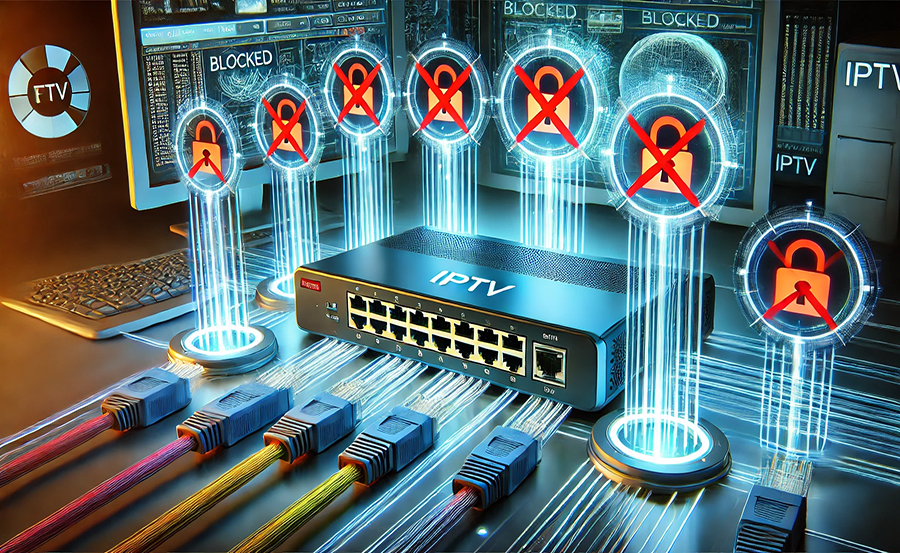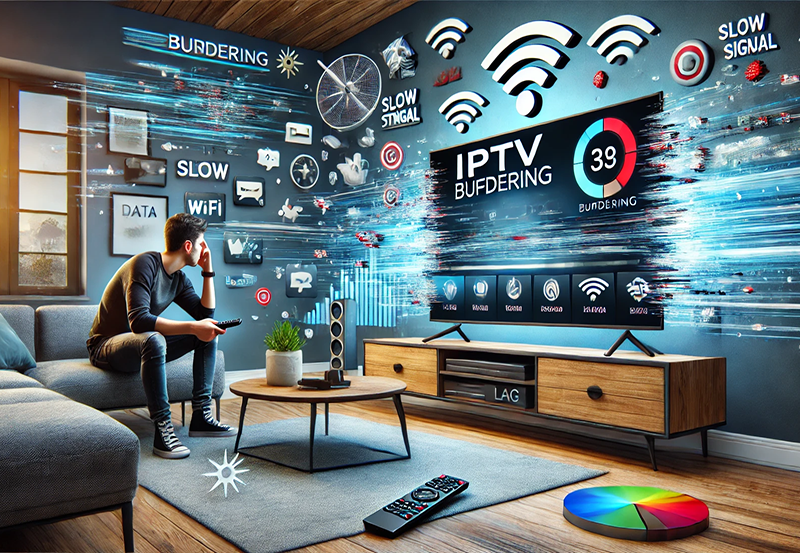In today’s digital age, IPTV (Internet Protocol Television) is revolutionizing how we consume media. From live sports to exclusive entertainment, IPTV offers a seamless experience for those seeking flexibility and variety. However, the issue of IPTV port blocking has become a significant challenge for many users. This article aims to unpack what IPTV port blocking is, why it happens, and how you can overcome it to enjoy the best IPTV for sports and other content. Navigating this landscape empowers consumers to make informed choices and elevate their IPTV viewing journey, even amidst technical challenges.
What is IPTV and How Does it Work?
IPTV delivers television content over the internet, offering a versatile alternative to traditional cable or satellite services. Essentially, it transmits media content via data packets rather than the conventional broadcasting methods. This evolution means you can access live TV, on-demand shows, and even exclusive channels from around the world, tailored to your schedule and preferences.
At its core, IPTV services operate using a private internet network. They convert traditional broadcast signals into IP signals, which are then sent via broadband connections. This process allows viewers to access their favorite channels on devices like smart TVs, smartphones, and PCs, as long as there is a reliable internet connection.
Quick Tip:
Discover premium UK TV channels with IPTV for UK channels and enjoy all your favorites.
Main Features of IPTV
IPTV’s popularity has soared due to its vast array of features. Understanding these can enhance your viewing experience:
- On-Demand Viewing: Access a library of shows and movies anytime.
- Live Broadcasting: Watch sports and live events as they happen.
- Interactive TV: Engage with interactive features and additional content options.
- Time-shifted TV: Pause, rewind, or record live broadcasts.
Understanding IPTV Port Blocking
IPTV port blocking occurs when internet service providers (ISPs) restrict access to certain ports used by IPTV services. This preventive measure can disrupt the streaming of content, causing inconvenience to users aiming for an uninterrupted viewing experience of top IPTV services.
The rationale behind this blocking often stems from legal regulations, network management, or conflicts with traditional broadcasting networks. ISPs may claim that such measures are employed to manage network traffic effectively or comply with copyright laws, but this often undermines consumer access and choice.
Technical Aspects of Port Blocking
Port blocking involves the ISP imposing restrictions on specific ports that IPTV streams use for data transfer. These ports are a critical component of the IPTV setup, facilitating the payload that constitutes your video content.
Each data stream sent over the internet utilizes specific ports, which are like gateways for content delivery. When an ISP blocks these ports, it essentially cuts off the flow of information, preventing the IPTV service from delivering its offerings effectively.
Why Do ISPs Block IPTV?
ISPs might block IPTV for multiple reasons, one being the handling of high bandwidth that IPTV consumes. Streaming HD content requires significant bandwidth, leading some ISPs to limit it to safeguard other users’ experiences. Furthermore, ISPs might also enforce port blocking due to pressures from content creators and traditional broadcasters concerned over licensing and viewership rights.
It’s also worth considering how ISPs may wish to protect their own competitive interests. As IPTV services offer alternatives to ISP-provided television bundles, there can be a resultant decline in such proprietary service subscribers, prompting ISPs to interdict the operational efficacy of these external IPTV entities via port blocking.
Steps to Bypass IPTV Port Blocking
Tackling the challenges posed by IPTV port blocking involves understanding and implementing various technical solutions. Here’s what you can consider to restore your full access to IPTV services.
Using a VPN Service
One of the most popular methods to bypass IPTV port blocking is using a Virtual Private Network (VPN). A VPN disguises your internet traffic, making it difficult for the ISP to identify IPTV traffic and, thus, block it. By encrypting your data and routing it through different servers, you not only bypass blocking efforts but also ensure your online privacy is maintained.
Choosing the Right VPN
Not all VPNs work well with IPTV, so it’s crucial to choose one that has a reputation for stable, high-speed connections. The key is selecting a service that offers unlimited bandwidth and does not retain logs of your activity to enhance safety and connectivity.
Port Forwarding Techniques
Port forwarding is another method users can employ to counteract IPTV port blocking. By manually configuring your router to enable specific ports used by IPTV services, you can bypass the blocks imposed by your ISP. However, this technique requires a degree of technical know-how and might not work if the ISP has stringent blocking policies.
Configuring Router Settings
To enable port forwarding, you need to access your router’s settings through an IP address. After logging in, navigate to the port forwarding section and input the correct details provided by your IPTV service. This allows your router to direct incoming and outgoing traffic through the right ports.
Switching ISPs
If blocking persists despite employing various methods, exploring other ISP options could be a feasible solution. Some ISPs are more lenient about IPTV services, offering unrestricted access that empowers viewers to make the most of their IPTV subscription.
Research Potential ISPs
Identify ISPs with favorable policies towards IPTV. Reviews and forums can provide anecdotal evidence of which providers accommodate IPTV services best. Making a switch could improve your viewing experience significantly.
Ensuring Optimal Viewing Experience
While circumventing port blocking is crucial, ensuring a stellar IPTV experience involves more than just access. Here are strategies to elevate your IPTV viewing journey beyond basic functionality.
Regular Software Updates
IPTV services frequently release updates to enhance performance and security. Regular software updates ensure that your service remains up-to-date with the latest features and patches that can also address any technical anomalies you might face.
Ensuring your devices, including set-top boxes and media players, are updated, can significantly boost streaming quality and connection stability.
Invest in High-Quality Equipment
A high-gain router and reliable streaming devices can make a world of difference in your IPTV viewing without constant buffering or sudden disconnections. Investing in good equipment ensures that you can enjoy uninterrupted and high-quality streams consistently.
Consider Wired Connections
Whenever possible, use wired connections to connect your devices instead of relying on Wi-Fi, which can suffer from interference and signal drops. Ethernet connections provide a consistent and strong connection pathway, conducive to stable IPTV streaming.
Monitor Internet Speed
Consistently monitored and maintained internet speeds ensure you’re hitting the recommended thresholds for steaming IPTV content smoothly without lag, especially for HD and 4K broadcasts.
ISPs occasionally throttle bandwidth, so regular speed checks can help identify and troubleshoot any inconsistencies that could hamper your viewing experience.
The Future of IPTV and Port Blocking
As technology evolves, so too will the landscape of IPTV and the measures to block or restrict it. Understanding where IPTV is headed can better prepare viewers for emerging trends and potentially new methods of obstructing service access.
Advanced Encryption Technologies
In the near future, more IPTV services might adopt advanced encryption technologies that make it even more challenging for ISPs to detect and block their signal. Enhanced encryption can give users more control over their viewing habits, away from prying eyes and meddling ISPs.
Collaborations and Legal Battles
Legal implications and potential collaborations between IPTV providers and ISPs could pave the way for more harmonious service delivery. As the demand for IPTV increases, such collaborations might lead to new service models, offering users packages that bridge traditional and online media comfortably.
Is Port Blocking Always a Bad Thing?
Although inconvenient for users, port blocking also serves crucial roles in cybersecurity and traffic management. Understanding its dual aspects allows viewers to appreciate the complexities ISPs face while striving for a balance between network management and consumer satisfaction.
Security Concerns
Port blocking can act as a security measure. Restricting access reduces the risk of DDoS attacks and other cybersecurity threats that could compromise user data and streaming integrity.
Network Efficiency
From a technical standpoint, blocking ports can help manage network congestion, ensuring a more equitable distribution of bandwidth among users. While challenging for IPTV enthusiasts, the broader benefits cannot be overlooked.
Frequently Asked Questions

Why does my ISP block IPTV ports specifically?
ISPs block IPTV ports due to network management practices, legal compliance related to content rights, and competition concerns. The objective is to regulate bandwidth usage and adhere to content licensing agreements.
Can using a VPN completely bypass port blocking?
While a VPN can effectively disguise your traffic and help bypass port blocks, its efficacy depends on various factors like the quality of the VPN service and ISP policies. It is not a guaranteed solution for all scenarios.
Is switching ISPs a viable long-term solution?
Yes, new ISPs might offer policies that are more favorable to IPTV services. Thorough research on different providers can help identify one with minimal restrictions, enhancing your viewing experience in the long run.
Are there legal risks associated with bypassing port blocking?
Bypassing port blocks can border on violating terms of service agreements with ISPs. It’s important to understand the legal implications and potential consequences of these actions in your region.
What equipment is necessary for optimal IPTV performance?
Investing in high-quality routers, set-top boxes, and using wired connections where possible is important. These components ensure a stable connection and better handling of IPTV streams, reducing buffering and enhancing quality.
How often should I update IPTV apps and related software?
For optimal performance and security, updating IPTV applications and associated software regularly is crucial. Keeping up with updates can introduce new features and resolve technical issues.
While port blocking poses challenges, understanding these complexities can enhance your IPTV experience significantly. Equip yourself with the right tools and knowledge to navigate this dynamic tech landscape successfully.
Best Practices for Using IPTV Smarter on Your Device





